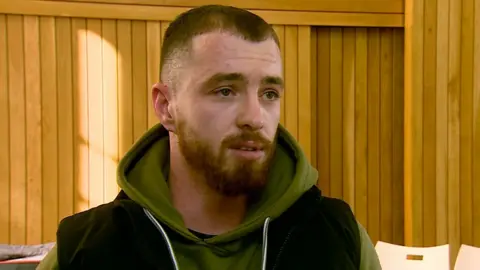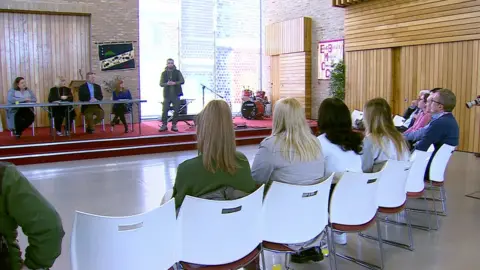European Social Fund: 'Vulnerable people in deep water' over cuts
"If this service gets taken away there's going to be loads of vulnerable people in deep water."
That is Belfast man Marc Young's stark assessment of the potential loss of funding to hundreds of groups who helped people like him.
About £40m in annual funding from the European Social Fund (ESF) is due to stop on 31 March as a result of Brexit.
While the UK government has promised to replace the money, it is not clear exactly when and how that will happen.
That means the jobs of an estimated 1,700 staff in charity and community groups are at risk.
For Marc and Ballymena woman Blair Anderson, that means the support that they got to turn their lives around may not be available to others.
Blair Anderson faced many problems in her teens.
"I was a young mum, I'd my daughter at 14 so back then my life looked bleak and I was involved with social services," she told BBC News NI.
"When I say I had no hope for the future, I remember going into a meeting with my social worker and saying like: 'I'm happy to be on the dole, I don't want or need to work because I have the option of being on benefits.'

"I was involved in anti-social behaviour, I had been arrested and my life was really going down a bad path.
"I was involved with alcohol and other substances that was impacting my life, impacting my mental health."
Like her, Marc also ran into problems at school and on the Shankill Road where he grew up.
"I had a lot of mental health issues and there was a lot of pressure on me in school to actually do well," he said.
"I just couldn't deal with the pressure growing up being a Protestant young man and I had to keep my emotions to myself."
While he got to university, he said he lasted "about two days" before dropping out.
"I had no drive, no passion, the only thing I wanted to do was sit in bed," he continued.
But eventually he began a 12-week employability programme run by the Include Youth organisation through the Alternatives group on the Shankill Road.
Blair, meanwhile, started a programme run by Include Youth called Give & Take.
Both said that had turned their lives around. Both, now in their 20s, are youth workers and back in education.

"It was the support that I actually got that motivated me and drove me to do well within my own life, for my family for my friends and for my future," Marc said.
For Blair, getting help meant she could "find my voice to continue to ask for support".
"Many times I failed, many times I had personal circumstances but that didn't impact," she said.
"They supported me with that along with my education, training and employment - something school didn't offer me.
"There was support provided around my child and being a parent, again something that wasn't accommodated in a school environment.
"That enabled me to flourish and enabled me to find myself."
'A scandal'
Both Blair and Marc spoke at an event held by East Belfast Mission to highlight the risks to groups which help disadvantaged, vulnerable and disabled people if European Social Funding is not replaced soon.
Others at the meeting described the situation as "a scandal".
About 30 staff at Include Youth, the organisation which helped Blair and Marc, are among those whose jobs may be lost.
Stormont used to top up the ESF money with about £14m a year in matched funding.
But with no executive it is not clear if that money will be available in 2023-24 either.
The UK government recently told BBC News NI that its Shared Prosperity Fund would match previous EU funding and increase in the coming years.
"As EU projects come to an end, funding from UK Shared Prosperity Fund will increase, reaching over £50m for Northern Ireland in 2023-24 and £74m in 2024-25, to spread opportunity, help local businesses and improve pride in place," a spokesperson said.
But with the deadline of 31 March for ESF funding running out less than three weeks away, Blair and Marc fear for the future.
"If the government doesn't step in or someone doesn't step in to save this service we're ultimately putting the most vulnerable back in an even more vulnerable position, to me that doesn't make sense," Blair said.
